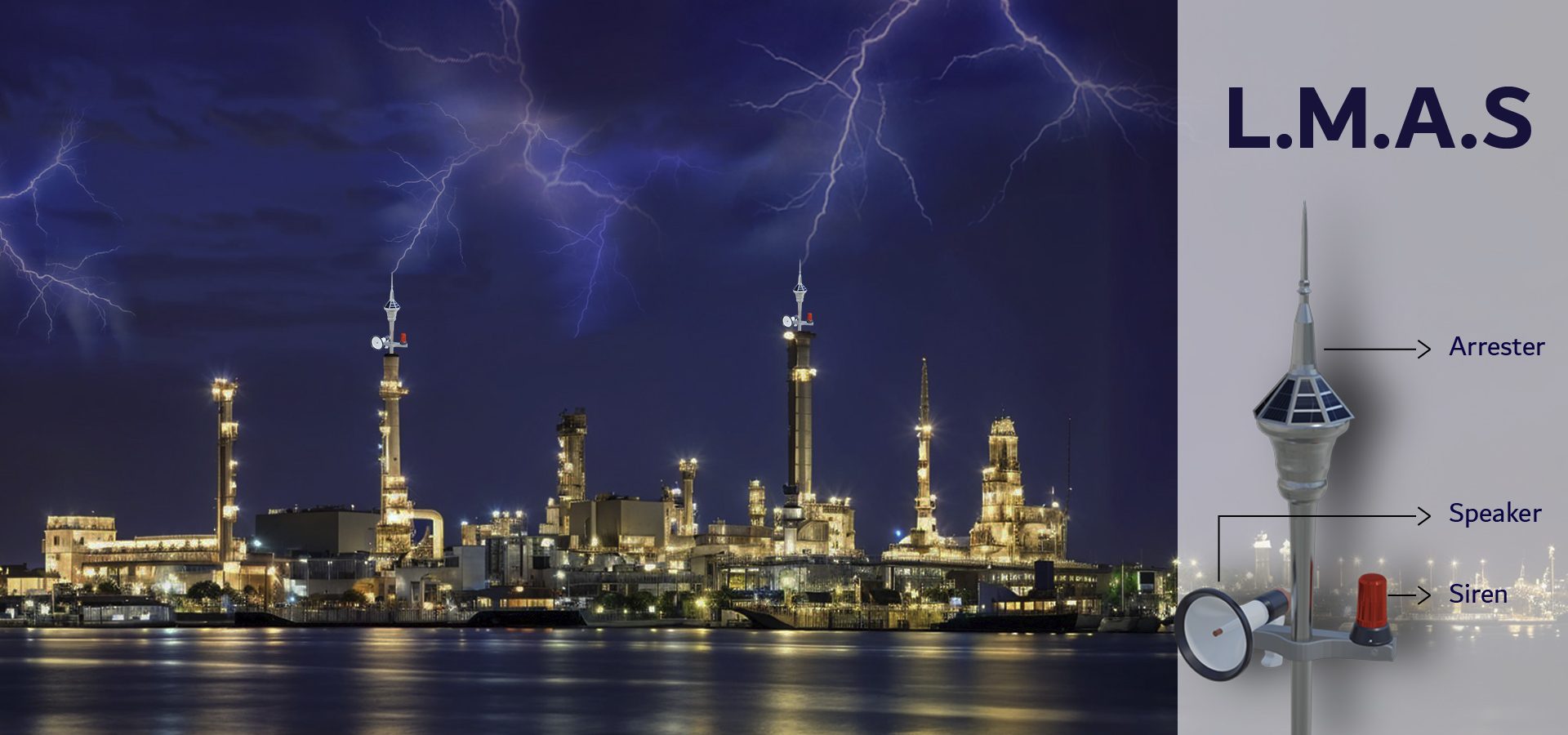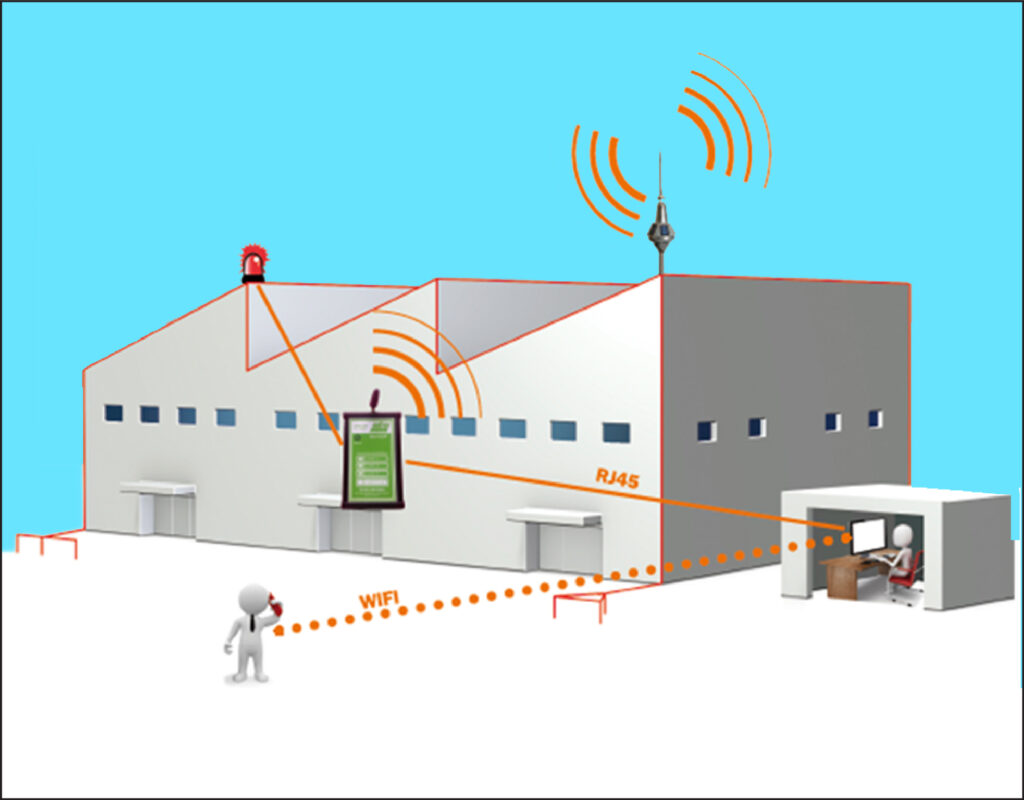
Lightning Management and Alert System (LMAS)
For 20 years, Manav has been protecting various industry segments from lightning surges. Lightning is an unpredictable phenomenon that discharges high-voltage surges that can flow into sensitive electronic instruments and communications systems, resulting in electrical and electronic equipment failures, unplanned accidents, and other hazardous incidents.
The system provides audiovisual warnings of storms or lightning. This allows people to take precautions and necessary safety measures, thus saving lives and livestock. This system predicts the occurrence of storms or lightning based on the surrounding environment.
Why Choose Lightning Management System (LMS)?
A one-of-a-kind system that provides the capability to manage lightning hazards by intelligently mitigating a lightning stick and providing a full-scale alert that ensures every person is in a safe zone.
The Lightning Management System (LMS) predicts storms and manages high energy dissipation. The Lightning Alert System (LAS) alerts the authorities of the prevailing unsafe conditions caused by lightning. LAS is integrated with LMS electronically to form LMAS that detects, predicts, measures, and annunciates the storm and lightning conditions in a given environment, thus providing safety and reliability.
Operational Principles of Lightning Management System (LMS) and Lightning Alert System (LMS)


The Lightning Management System (LMS) predicts storms and lightning, automatically shifting sensitive equipment to backup power to keep it safe. Once conditions are stable, it switches back to main power and safely channels any surges away from critical systems. The Lightning Alert System (LAS) warns people nearby with lights and sirens, giving them time to move to safety. It’s a simple but powerful tool to prevent accidents in places like construction sites, airports, solar farms, and factories.
How Does the Lightning Management and Alert System Work?
A Lightning Management and Alert System (LMAS) uses sensors and algorithms to detect lightning, predict storms, and issue alerts to ensure safety. These alerts are often sent through sirens, text messages, or other communication channels, allowing people to take necessary precautions.
Key Features of Lightning Management and Alert System (LMAS )
Intelligent lightning mitigation
LMAS detects, predicts, measures and announces the arrival of storm and lightning conditions in a given environment.
Audio & Visual Alert System
During lightning and storm conditions, LAS sends visual and siren alerts to all nearby personnel, ensuring timely evacuation to safe zones.
Data Collection & Analysis
The system provides real-time data on storm activities within a set radius allowing for informed decision-making and proactive safety measures.
Solar-Based Battery
The Lightning Alert System is powered by a 12 V(18Ah) Lithium ferro phosphate battery, which is changed using the installed solar panel.
Key Benefits of Lightning Management and Alert System (LMAS)
End-to-End Protection
Cost Cutting
Reduced Equipment Damage
Increased Safety
Preventing Downtime
Manav's Commitment to Lightning Management System and Safety
Manav, a global leader in the electrical sector, offers solutions to detect lightning strikes with its own product, LMAS (Lightning Management Alert System). It combines a Lightning Management System (LMS) and a Lightning Alert System (LAS) to provide a comprehensive lightning protection solution. The component is designed to detect, predict, and mitigate lightning strikes, providing alerts for safety and reliability. LMAS ensures business continuity and minimizes downtime to reduce the risk of electrical fires.
Unlike traditional lightning systems, which only divert lightning, LMAS actively predicts lightning strikes, provides real-time alerts, and automatically manages electrical systems to reduce risks and ensure safety.
No, LMAS does not require manual operation. It operates automatically using intelligent sensors and algorithms to monitor atmospheric changes, trigger alerts, and initiate power-switching processes without manual input.
To accurately predict lightning and storm activity, LMAS uses advanced atmospheric sensors and real-time data analysis within a radius of up to 20 km, giving you early warnings to act safely.
LMAS significantly reduces downtime, prevents equipment failures
supports uninterrupted operations to protect assets from surge damage and gives early warning.
1. LMS (Lightning Management System): Predicts storms and manages energy dissipation.
2. LAS (Lightning Alert System): Sends siren and light alerts when unsafe lightning conditions are detected
Contact Form

